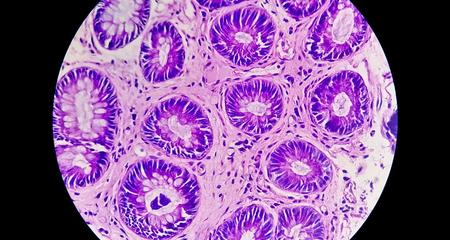Colorectal cancers are complicated diseases requiring coordinated, comprehensive care. As part of the Clinical Cancer Center, the Colorectal Cancer Program takes an interdisciplinary approach, where physicians from different medical and surgical specialties work closely together to deliver the best possible patient care. Below are some of the programs and services available through our Colorectal Cancer Program:
- Rectal Cancer
- Colon Cancer
- Anal Cancer
- Rare Cancers: Small Bowel Cancer & Appendix Cancer
- Metastatic Disease and Advanced Cancers
- Hereditary Colorectal Cancer Syndromes
Colon Cancer Staging
Staging is a way to describe the extent or severity of a person’s cancer. It is based on the extent of the primary tumor and how much the tumor has spread. Staging is an important step:
- Helps your physician team plan your treatment
- Can be used to help predict outcomes
- Can pinpoint clinical trials for which a patient may be eligible
Stage 0
Abnormal cells are found in the innermost lining of the colon or rectum. These abnormal cells may become cancer and spread into nearby normal tissue. Stage 0 is also called carcinoma in situ.
Stage I
Cancer has formed and spread beyond the innermost tissue layer of the colon or rectum wall to the middle layers. Stage I colon cancer is sometimes called Dukes A colon cancer.
Stage II
Colon cancer is divided into stage IIA and stage IIB. Stage II colon cancer is sometimes called Dukes B colon cancer.
- Stage IIA cancer has spread beyond the middle tissue layers of the colon or rectum wall or has spread to nearby tissues around the colon or rectum.
- Stage IIB cancer has spread beyond the colon or rectum wall into nearby organs and/or through the peritoneum.
Stage III
Colon cancer is divided into stage IIIA, stage IIIB and stage IIIC. Stage III colon cancer is sometimes called Dukes C colon cancer.
- Stage IIIA cancer has spread from the innermost tissue layer of the colon or rectum wall to the middle layers and has spread to as many as three lymph nodes
- Stage IIIB cancer has spread to as many as three nearby lymph nodes and has spread:
- Beyond the middle tissue layers of the colon or rectum wall
- To nearby tissues around the colon or rectum
- Beyond the colon or rectum wall into nearby organs and/or through the peritoneum
- Stage IIIC: Cancer has spread to four or more nearby lymph nodes and has spread:
- To or beyond the middle tissue layers of the colon or rectum wall
- To nearby tissues around the colon or rectum
- To nearby organs and/or through the peritoneum.
Stage IV
Cancer may have spread to nearby lymph nodes and has spread to other parts of the body, such as the liver or lungs. Stage IV colon cancer is sometimes called Dukes D colon cancer.
Virtual Visits Are Available
Safe and convenient virtual visits by video let you get the care you need via a mobile device, tablet or computer wherever you are. We’ll gather your medical records for you and get our experts’ input so we can offer treatment options without an in-person visit. To schedule a virtual visit, call 1-866-680-0505.
Recognized as High Performing by U.S. News & World Report
Froedtert Hospital is recognized by U.S. News & World Report as high performing in three adult specialties and 16 procedures and conditions, including cancer, colon cancer surgery and gastroenterology and GI surgery.More to Explore





